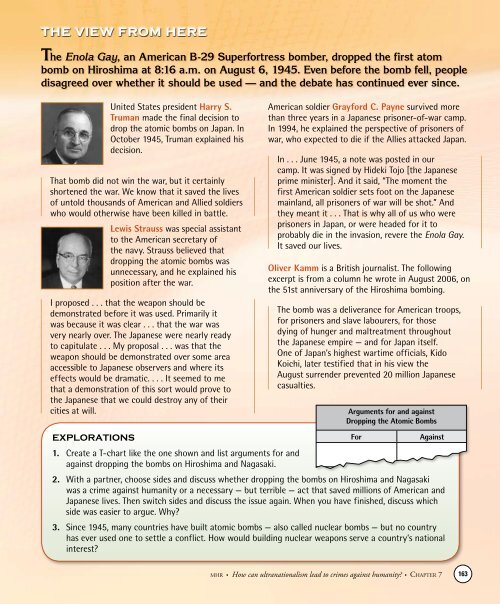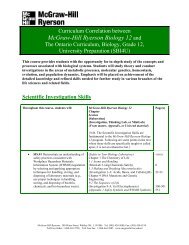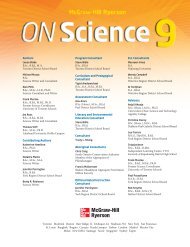Ultranationalism and Crimes against Humanity - McGraw-Hill Ryerson
Ultranationalism and Crimes against Humanity - McGraw-Hill Ryerson
Ultranationalism and Crimes against Humanity - McGraw-Hill Ryerson
You also want an ePaper? Increase the reach of your titles
YUMPU automatically turns print PDFs into web optimized ePapers that Google loves.
tHE ViEW From HErE<br />
The Enola Gay, an American B-29 Superfortress bomber, dropped the first atom<br />
bomb on Hiroshima at 8:16 a.m. on August 6, 1945. Even before the bomb fell, people<br />
disagreed over whether it should be used — <strong>and</strong> the debate has continued ever since.<br />
United States president Harry S.<br />
Truman made the final decision to<br />
drop the atomic bombs on Japan. In<br />
October 1945, Truman explained his<br />
decision.<br />
That bomb did not win the war, but it certainly<br />
shortened the war. We know that it saved the lives<br />
of untold thous<strong>and</strong>s of American <strong>and</strong> Allied soldiers<br />
who would otherwise have been killed in battle.<br />
Lewis Strauss was special assistant<br />
to the American secretary of<br />
the navy. Strauss believed that<br />
dropping the atomic bombs was<br />
unnecessary, <strong>and</strong> he explained his<br />
position after the war.<br />
I proposed . . . that the weapon should be<br />
demonstrated before it was used. Primarily it<br />
was because it was clear . . . that the war was<br />
very nearly over. The Japanese were nearly ready<br />
to capitulate . . . My proposal . . . was that the<br />
weapon should be demonstrated over some area<br />
accessible to Japanese observers <strong>and</strong> where its<br />
effects would be dramatic. . . . It seemed to me<br />
that a demonstration of this sort would prove to<br />
the Japanese that we could destroy any of their<br />
cities at will.<br />
Explorations<br />
1. Create a T-chart like the one shown <strong>and</strong> list arguments for <strong>and</strong><br />
<strong>against</strong> dropping the bombs on Hiroshima <strong>and</strong> Nagasaki.<br />
American soldier Grayford C. Payne survived more<br />
than three years in a Japanese prisoner-of-war camp.<br />
In 1994, he explained the perspective of prisoners of<br />
war, who expected to die if the Allies attacked Japan.<br />
In . . . June 1945, a note was posted in our<br />
camp. It was signed by Hideki Tojo [the Japanese<br />
prime minister]. And it said, “The moment the<br />
first American soldier sets foot on the Japanese<br />
mainl<strong>and</strong>, all prisoners of war will be shot.” And<br />
they meant it . . . That is why all of us who were<br />
prisoners in Japan, or were headed for it to<br />
probably die in the invasion, revere the Enola Gay.<br />
It saved our lives.<br />
Oliver Kamm is a British journalist. The following<br />
excerpt is from a column he wrote in August 2006, on<br />
the 51st anniversary of the Hiroshima bombing.<br />
The bomb was a deliverance for American troops,<br />
for prisoners <strong>and</strong> slave labourers, for those<br />
dying of hunger <strong>and</strong> maltreatment throughout<br />
the Japanese empire — <strong>and</strong> for Japan itself.<br />
One of Japan’s highest wartime officials, Kido<br />
Koichi, later testified that in his view the<br />
August surrender prevented 20 million Japanese<br />
casualties.<br />
Arguments for <strong>and</strong> <strong>against</strong><br />
Dropping the Atomic Bombs<br />
For Against<br />
2. With a partner, choose sides <strong>and</strong> discuss whether dropping the bombs on Hiroshima <strong>and</strong> Nagasaki<br />
was a crime <strong>against</strong> humanity or a necessary — but terrible — act that saved millions of American <strong>and</strong><br />
Japanese lives. Then switch sides <strong>and</strong> discuss the issue again. When you have finished, discuss which<br />
side was easier to argue. Why?<br />
3. Since 1945, many countries have built atomic bombs — also called nuclear bombs — but no country<br />
has ever used one to settle a conflict. How would building nuclear weapons serve a country’s national<br />
interest?<br />
m h R • How can ultranationalism lead to crimes <strong>against</strong> humanity? • Ch a p t e R 7 163

















